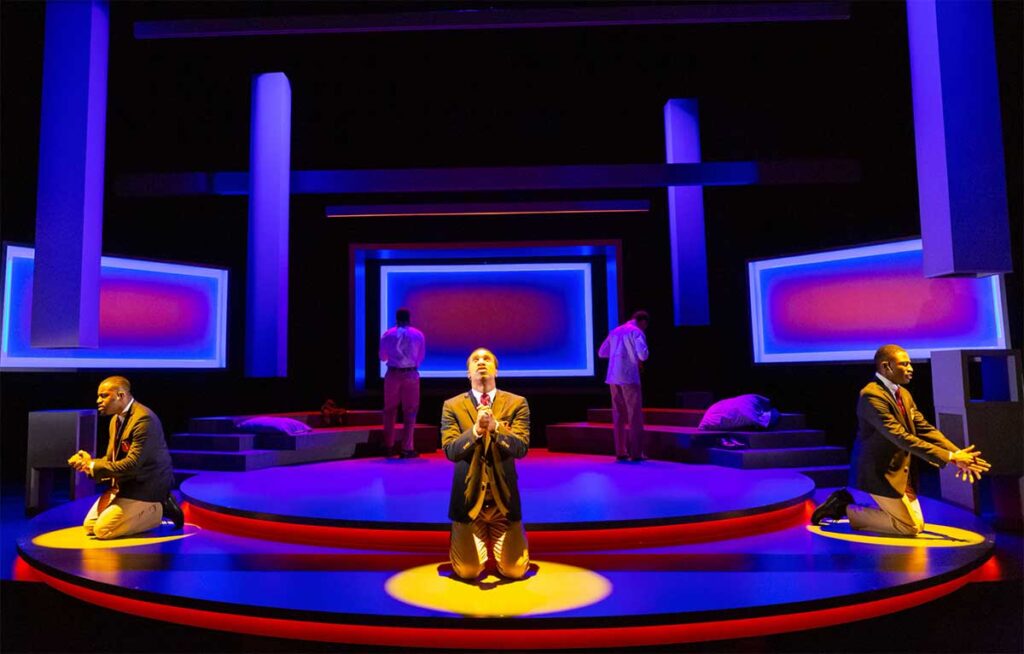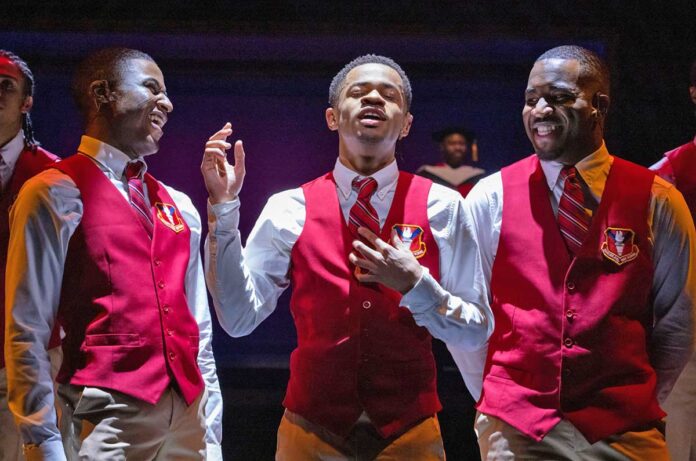Justen Ross graduated from The Theatre School at DePaul University at the height of the pandemic, a time when pursuing a career in the live performing arts was at its most precarious. A year later, he’s headlining the Philly premiere of “Choir Boy” at Philadelphia Theatre Company, already comfortable taking on a major leading role. The play, by Tarell Alvin McCraney (the Oscar-winning co-writer of “Moonlight”) follows a young Black queer man as he navigates life at a religiously affiliated boarding school. It tells a story to which Ross can intimately relate.
PGN recently spoke with Ross about his fast-rising career, his relationship to faith as a queer Black man, and his experiences working in Philly for the first time. Some responses have been condensed and edited for clarity.
You just started previews a few days ago. How has the reaction been now that the show is in front of a live audience?
It’s felt like so long since I’ve gotten to be onstage in front of an audience. I graduated last year from conservatory, and I wasn’t able to do a senior show. But honestly, this show in particular feels like such an assignment – like God needed me to be exactly where I am to tell this story right now. Somebody needed it, I needed it. So this past weekend with previews has really just been me and guys trying to find our sweet spot with each other. We’ve been shocked at some parts with the audience reaction. We didn’t know that certain moments were going to resonate. It seems like every night people get a little more comfortable with clapping, with shouting. It’s a musical play, so sometimes people don’t know whether they can applaud or express themselves. Because of the culture of theater, some people expect to sit and applaud after the number, but this is not that show. This show is church, so we are waiting for the audience to feel comfortable at church.

As an actor, do you feel you need to recalibrate from performing a quiet, intimate scene to a moment when you’re singing and dancing and expressing yourself more exuberantly?
There are slight recalibrations you have to do, but I think it’s very nuanced and specific. It’s a story about these young boys turning from boys into men, in a world that steals Black men’s softness at too young an age. So all these boys are going through something they can’t give voice to. The singing moments honestly feel effortless because they are the moments where we get to express the turmoil, the trials, the obstacles that we are going through. We get to marry our voices together, blend and harmonize, and find peace amid the turmoil. Bouncing back and forth requires some recalibration, but it also feels like one body, one ecosystem as these men try to figure out what medium serves them.
Do you feel a kinship to the character you’re playing?
Oh, absolutely. When I was younger, I actually went to a school called Charles R. Drew [the name of the preparatory school in the play]. I’ve been to an all-boys middle school, I’ve been to a Catholic school. I know what it’s like to go to an all-boys institution, and I also know what it’s like to go to a school where Christian values are at the center of the school’s values. And I’m also a queer Black man, a gay Black man. This play came at exactly the right time, in a way that you can’t set up. Only God could set it up. This is the first play I remember reading where I felt like I heard myself, at the age of fifteen. I was in the closet still – I wasn’t as out and proud and flamboyant as Pharus is. But I felt that could be in my future – that level of comfortableness and joy in expression could be in the cards for me. And now, just a few years later, it is in the cards for me. I relate heavily to Pharus’ enduring and his need to compensate in so many other areas. He has to be undeniable in all these other areas because his sexuality makes him deniable. So he’s going to be choir lead, he’s going to be president of the drama club, he’s going to get all As – that’s who I was. It was that overcompensation to feel like I was just enough, and you become addicted to proving yourself. I have a deep connection to this character, and Pharus is teaching me how to be consistent in prayer, to trust in God and that there is joy in the pathless woods.
I believe this is your first time working in Philadelphia. How have you found it spending time here?
First time in the city and first time working here. I’m enjoying it. Traveling is in my blood. Both my grandmothers worked for United Airlines, so I love to travel. I love to look around the city and find new things that I can get into. Because I’ve been in rehearsal, I haven’t been able to do too much sightseeing yet. But for the most part, Philly has been treating me really well. The people have been kind to me. I walk home every day with my cast, and we’re staying in a beautiful area right by the Gayborhood. It’s been fab. I’m looking forward to once we’re open and have a lighter schedule to do some sightseeing and check out some of the iconic foods of Philly.
“Choir Boy” runs through March 13 at the Suzanne Roberts Theatre, 480 S. Broad Street (corner of Lombard Street). For tickets and information, visit philadelphiatheatrecompany.org/. Proof of vaccination, with a booster shot if eligible, and masks are required to attend performances.

